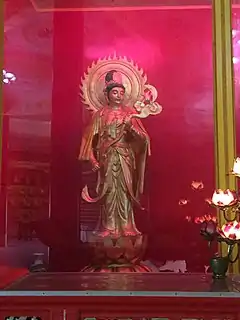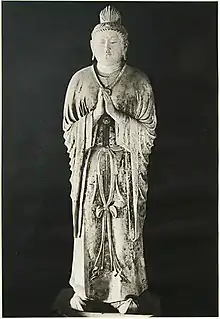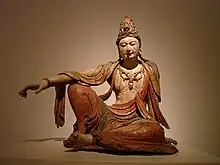| Candraprabha | |
|---|---|
 Candraprabha, Tiantan Garden, Shantou | |
| Sanskrit | चन्द्रप्रभ
Candraprabha |
| Chinese | 月光菩薩 (Pinyin: Yuèguāng Púsà) 月光遍照菩薩 (Pinyin: Yuèguāng Biànzhào Púsà)) 月光普照菩薩 (Pinyin: Yuèguāng Pǔzhào Púsà) 月净菩薩 (Pinyin: Yuèyào Púsà |
| Japanese | 月光菩薩 (romaji: Gakkō Bosatsu or Gekkō Bosatsu) 月光遍照菩薩 (romaji: Gakkō Henjō Bosatsu) 月光王菩薩 (romaji: Gakkō Ō Bosatsu) 月浄菩薩 (romaji: Getsujō Bosatsu) |
| Khmer | ចន្ទ្រប្រភា (chan-pra-phiea) |
| Korean | 월광보살 (RR: Wolgwang Bosal) 월광변조보살 (RR: Wolgwang Byeonjo Bosal) 월정보살 (RR: Woljaeng Bosal) |
| Tagalog | Candlaplabha |
| Thai | พระจันทรประภาโพธิสัตว์ |
| Tibetan | ཟླ་འོད་ Wylie: zla 'od THL: da ö |
| Vietnamese | Nguyệt Quang Bồ Tát |
| Information | |
| Venerated by | Mahayana, Vajrayana
|

Candraprabha (lit. 'Moonlight', Chinese: 月光菩薩; pinyin: Yuèguāng Púsà; Rōmaji: Gakkō or Gekkō Bosatsu) is a bodhisattva often seen with Sūryaprabha, as the two siblings serve Bhaiṣajyaguru.[1] Statues of Candraprabha and Sūryaprabha closely resemble each other and are commonly found together, sometimes flanking temple doors. They are also recognized in mainland Asia as devas.
See also
References
- ↑ Settar, S. (1969). "The Cult of Jvālāmālinī and the Earliest Images of Jvālā and Śyāma". Artibus Asiae. 31 (4): 309–320. doi:10.2307/3249339. ISSN 0004-3648. JSTOR 3249339.
This article is issued from Wikipedia. The text is licensed under Creative Commons - Attribution - Sharealike. Additional terms may apply for the media files.
